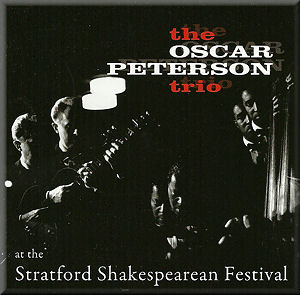1. Falling in Love with Love
2. How About You?
3. Flamingo
4. Swinging on a Star
5. Noreen's Nocturne
6. Gypsy in My Soul
7. How High the Moon
8. Love You Madly
9. 52nd Street Theme
10. Nuages
11. Daisy's Dream
Oscar Peterson - Piano
Ray Brown - Bass
Herb Ellis - Guitar
You don't know what you've got until it's gone. Some years ago, when
I was presenting a jazz programme on radio, someone requested a track
from Oscar Peterson's famous concert at the 1956 Stratford Shakespearean
Festival in Ontario. Try as I might, I couldn't find a copy of the
album because it had been deleted from the catalogue. Now it is back,
thanks to this series of reissues which makes available some of the
highest-praised jazz albums ever recorded. It should always be available
as it is one of the finest recordings that this trio ever made during
its existence in the mid-fifties.
Peterson, Brown and Ellis had already worked together as a trio since
1953 and their playing was finely honed without ever being routine.
One thing that strikes me particularly about the music here is the
group's awareness of the value of tension-and-release. There is a
noticeable shift of gears after Ray Brown or Herb Ellis has done a
solo and the trio chugs off into that superbly swinging blend of sparkling
piano backed by unstoppable bass and drums. There is a sudden shift
from the voice of a single musician to a trio playing together as
one. It is a united sound which I have never heard from any other
piano trio, and it never fails to lift the spirit.
There is also contrast in the choice of tunes, moving between tender
ballads and up-tempo excursions. For instance, the breakneck Swinging
on a Star is followed by the more pensive (but still swinging)
Noreen's Nocturne. The piano-guitar-bass line-up is clearly
modelled on those of Nat "King" Cole and Art Tatum - who
were both idols of Peterson's. Oscar borrows the idea of interspersing
pure improvisation with pre-arranged passages which impart structure
to the tunes. But the Peterson trio cannot be described as derivative,
since it was so unique - and Oscar varies the sound by distributing
the duties on each song diversely between the three members.
Peterson gives his sidemen plenty of solo space. Ray Brown's intonation
is dubious in his arco solo on Flamingo but plucked bass solos
like those on How About You? and How High the Moon are
impeccably tuneful and logical. Herb Ellis also provides some great
solos, and his work as a rhythm guitarist is just right to assist
the trio's drive. Herb knew that the guitar as a rhythm instrument
is best used to play simple rhythmic chords, rather than trying to
decorate the music with single lines.
Still, the undoubted star of the trio is Oscar Peterson, with his
reliable swing, faultless technique and the ability to generate excitement
and then raise it to ever higher levels. A good example of this is
Love You Madly, where the trio maintains a moderate tempo until
Oscar raises the stakes with one of those spine-tingling two-handed
rolls of his. His brilliance is on display throughout this album.
Just sample a track like Gypsy in My Soul and wonder at its
energy and technical assurance.
The original LP consisted of the first nine tracks, which were recorded
on the second night of the trio's two-night appearance at Stratford.
The last two are Django Reinhardt's Nuages, which features
Herb Ellis, and Daisy's Dream, a composition by Peterson which
he describes as "a miniature jazz suite". It certainly fits
this description, as it lasts for 12 minutes and passes through various
sections representing different dance styles. Oscar says it was inspired
by John Lewis, and it has some of the baroque flavour of some of Lewis's
compositions for the Modern Jazz Quartet. It opens with a stately
semi-classical piece, then moves through a waltz into a jazzier phase
(with overtones of Bach) which eventually becomes the fully-fledged
jazz trio we know and love, steaming ahead. The piece returns to elegant
counterpoint before its dreamy close.
There are only three flaws to this CD, although they can be distracting.
Two of them come from Peterson himself: his tapping foot and his frequent
habit of singing (almost growling) along with his own improvisation.
The third annoyance is the familiar one of the audience clapping after
virtually every solo, obscuring the start of the next musician's solo.
It's a habit I hate, especially as it seems to have become obligatory
for jazz audiences, even though it is seldom heard in the "serious"
concert hall. Worst of all is when the audience applauds in the wrong
place, as in Swinging on a Star - before Ray Brown has finished
swapping eights with Herb Ellis. And why do some audience members
whistle so ear-piercingly instead of applauding?
These grouches aside, this is an album for every serious admirer
of jazz. In the original sleeve-notes, Peterson wrote: "I honestly
believe that this recording of the Trio in our best to date".
And who can argue with the master?
Tony Augarde
